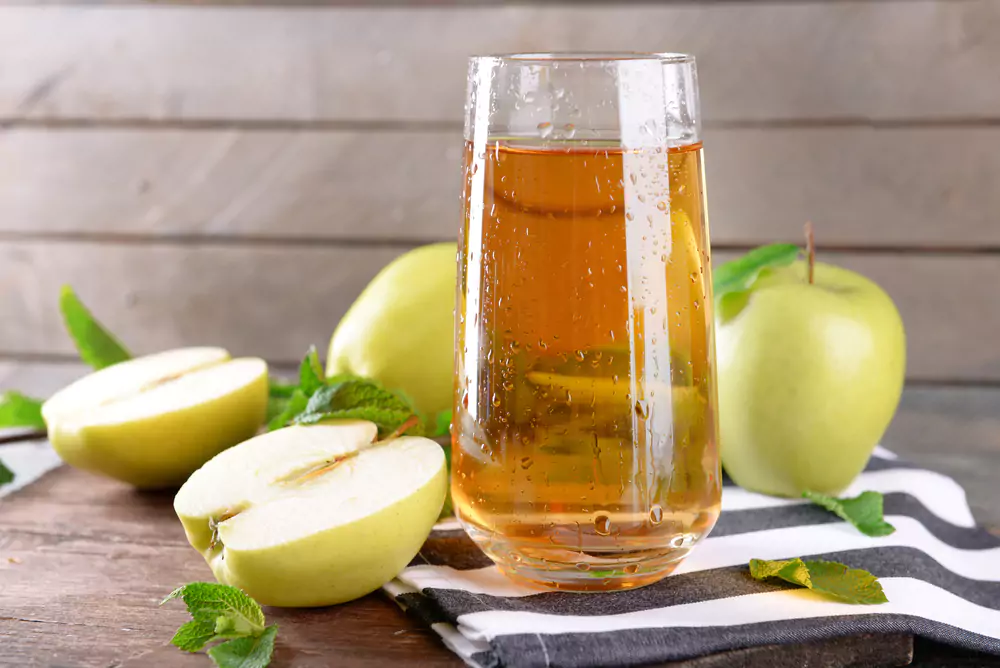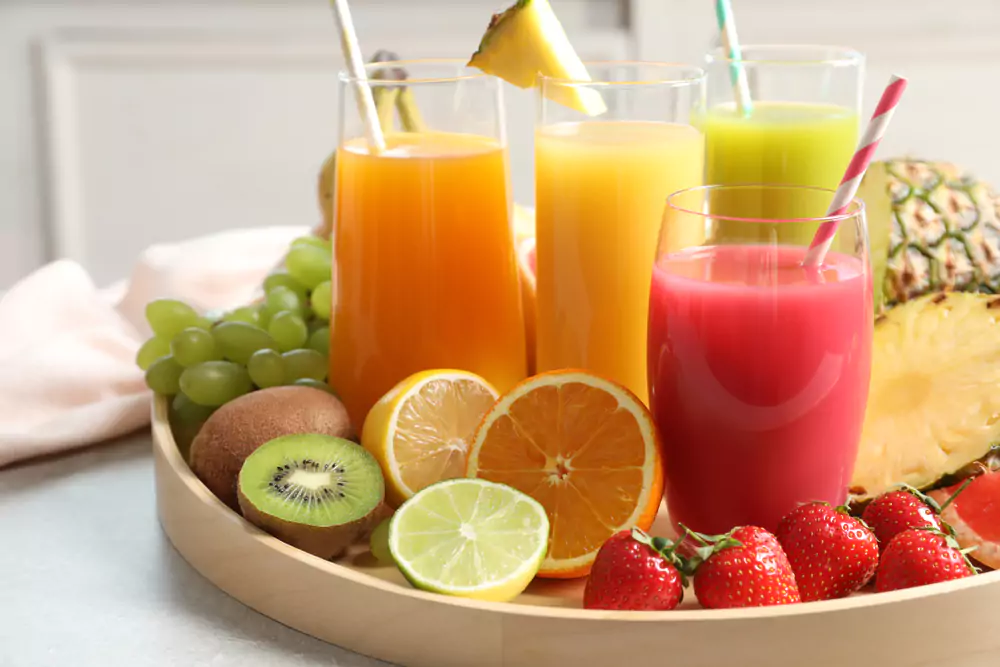Fresh juice has become increasingly popular among health-conscious individuals due to its numerous benefits, such as providing essential nutrients, vitamins, and minerals. However, one question that often arises is ”How long does a fresh juice can last? ”
The shelf life of fresh juice is a concern for many people, as they want to make sure that their juice is safe to consume and maintains its nutritional value. This can be especially important if you are storing the juice for later consumption or if you have invested time and effort into making your juice at home.
To determine how long fresh juice lasts, several factors need to be considered, such as the type of juice, storage conditions, and the presence of preservatives. By understanding these factors, you can make informed decisions about how to best store and enjoy your fresh juice.
This article aims to provide a comprehensive answer to this query, discussing the factors that influence juice shelf life and offering practical tips to ensure that you enjoy your freshly made juice at its peak quality.
5 Factors That Affect How Long Your Homemade Juice Lasts In The Fridge
Homemade juice can be a delicious and nutritious addition to your daily routine. However, it’s essential to know how long it will last in the fridge to ensure that you’re consuming it at its best. Several factors can affect the shelf life of your homemade juice, including the type of juicer used, the type of produce, the container used, the temperature of the fridge, and the acidity of the juice.

Type Of Juicer Used
The type of juicer you use to extract juice from your fruits and vegetables can impact how long it lasts. Masticating juicers, which extract juice slowly and at a lower temperature, can help preserve the nutrients and freshness of the juice for longer periods. On the other hand, centrifugal juicers, which extract juice quickly and at a higher temperature, may cause the juice to spoil more quickly.
Type Of Produce
Different fruits and vegetables have varying levels of natural preservatives. For example, citrus fruits like oranges and lemons have a higher acidity, which can help preserve the juice for a longer time. Meanwhile, fruits like apples and pears may not last as long due to their lower acidity levels. Similarly, leafy greens like spinach and kale may oxidize more quickly, causing the juice to spoil faster.
Type Of Container
The container you choose to store your homemade juice can also affect its shelf life. Glass containers, such as mason jars, are an excellent option as they are non-reactive and do not alter the taste or quality of the juice. Plastic containers, on the other hand, may leach chemicals into the juice, affecting its taste and potentially harming your health.
The Temperature Of Fridge
The temperature inside your fridge plays a crucial role in preserving the freshness of your homemade juice. Storing juice at a consistent temperature of around 35-40°F (2-4°C) can help slow down bacterial growth and oxidation, extending its shelf life. Additionally, it’s essential to store the juice in the coldest part of the fridge, usually at the back and on the bottom shelf.
The Acidity Of The Juice
As mentioned earlier, the acidity of the juice can impact its shelf life. A higher acidity level, typically found in citrus fruits, helps to preserve the juice for a longer time. However, if your juice has a low acidity level, consider adding a small amount of citrus juice or vinegar to help preserve it.
6 Tips To Make Your Homemade Juice Last Longer
As a juice enthusiast, I’ve always been on the lookout for ways to make my homemade juice last longer. After trying out various methods, I’ve narrowed down my favorite tips to help you keep your juice fresh for an extended period.

Use Airtight Glass Containers
Storing your juice in airtight glass containers is crucial for maintaining its freshness. Glass is a non-porous material that prevents any contaminants from entering the container. Additionally, airtight containers prevent any air exposure, which can cause oxidation and spoilage.
Store It Right Away
It’s essential to store your homemade juice as soon as possible after making it. This helps to prevent any exposure to air, bacteria, or other contaminants that could spoil your juice.
Fill The Container To The Brim
Filling the container to the brim helps to minimize the amount of air inside, which can lead to spoilage. By maximizing the space in your container, you create a barrier against air exposure and help maintain the freshness of your juice.
Freeze The Juice
Freezing your juice can help extend its shelf life. When freezing, make sure to use a freezer-safe container and leave some space for expansion. Thaw the juice in the refrigerator before consuming it to maintain its freshness.
Vacuum Seal The Container
Vacuum sealing your juice is an excellent way to preserve its freshness. This method removes all the air from the container, preventing oxidation and spoilage. You can use a vacuum sealer or a simple jar vacuum sealer to achieve this.
Add Citrus Fruit
Adding citrus fruits like lemon or lime to your juice can help preserve it by adding natural acidity. This acidity helps to slow down the growth of bacteria and prolong the juice’s shelf life.
Signs Of Spoiled Juice
Now that I have shared some tips with you to make your homemade juice last longer let’s discuss the signs of spoiled juice. It is essential to be aware of these signs to ensure you and your family consume fresh and healthy juice.

Off smell
The first sign of spoiled juice is an unpleasant smell. Fresh juice should have a pleasant aroma, while spoiled juice may have a musty, sour, or fermented odor. I experienced this when I left my juice in the refrigerator for a few days and noticed a strange smell when I opened it. This is a clear indication that the juice has gone bad.
Change in color
Fresh juice is typically clear, bright, and vibrant in color. However, if you notice a change in color, such as the juice becoming dull or murky, it may indicate spoilage. In my experience, I once made carrot juice, and after a few days, I noticed that the juice had turned brown and cloudy, indicating that it had spoiled.
Separation of layers
Fresh juice should be homogeneous, with no visible layers. If you see layers separating, such as a liquid layer on top and a solid layer at the bottom, it is a sign that the juice has spoiled. This can happen due to the separation of sediments, proteins, or fats. I experienced this when I made beet juice and noticed a solid layer of beet pulp at the bottom after a few days.
Taste
Fresh juice should taste clean, crisp, and flavorful. If you notice a change in taste, such as it being overly sweet, sour, or bitter, it may indicate spoilage. I once made apple juice and after a week, I noticed it tasted too sweet and lost its original flavor.
Mold or yeast growth
Another sign of spoiled juice is the presence of mold or yeast growth. Mold or yeast can grow on the surface of the juice or in the sediment at the bottom. If you see any fuzzy or slimy growth, discard the juice immediately. In my experience, I once made pineapple juice, and after a few days, I noticed a layer of mold on top.
Bubbles or foam
If you see bubbles or foam on the surface of the juice, it could be a sign of fermentation, which means the juice has spoiled. I once made orange juice and noticed bubbles forming on the surface after a few days, indicating that fermentation had occurred.
How Long Can I Keep Fresh Juice In A Fridge?

Many people are concerned about the shelf life of fresh juice stored in a fridge. As someone who loves to make and enjoy fresh juice, I have also wondered about this. After doing some research, fresh juice can generally be stored in a fridge for up to 3 days. However, this can vary depending on the type of juice and how it is stored.
To ensure your fresh juice stays fresh for as long as possible, it’s important to follow some guidelines. First, always use clean and sanitized equipment when making your juice, as this can help prevent bacterial growth. Second, store the juice in an airtight container to minimize contact with air, which can cause oxidation and spoilage. Finally, consume the juice within 24-72 hours for optimal freshness.
How Long Can I Keep Fresh Juice In A Freezer?
Other than the fridge, one of the best places to store fresh juice is in a freezer. The duration you can keep fresh juice in a freezer depends on the type of juice and the freezing conditions. Generally, most fruit and vegetable juices can last for 3 to 6 months when stored in a freezer.
To ensure the best quality and taste of the juice, it is essential to follow some guidelines. First, always store the juice in airtight containers or freezer-safe bags to prevent any exposure to air, which can cause freezer burn and affect the taste. Second, it’s important to cool the juice down before freezing, as this helps to prevent any separation of ingredients and maintains a consistent texture.
How Long Can I Keep Fresh Juice In A Mason Jar?
Mason jars are a popular choice for storing various items, including fresh juice. They are made of Glass, which provides a natural barrier against the growth of bacteria and other microorganisms. This makes them an excellent option for storing fresh juice for an extended period.
Several factors can affect how long fresh juice can be stored in a Mason jar. These include the type of juice, the presence of any additives, and the method used to seal the jar.
Type of Juice
Different juices have varying levels of acidity and sugar content. Acidity and sugar content can affect the growth of bacteria and the oxidation process, which can impact the juice’s freshness and shelf life. For example, citrus juices have a higher acidity level, which can help preserve them for a more extended period.
Additives
Adding preservatives or other ingredients, such as ascorbic acid or citric acid, can help extend the shelf life of fresh juice. These additives work by inhibiting the growth of bacteria and preventing oxidation.
Sealing Method
Properly sealing a Mason jar can help preserve the freshness of the juice by limiting exposure to air and other contaminants. Using a screw-on lid or airtight seal is essential for maintaining the freshness of the juice.
Most Popular Preservation Methods In The Juice Industry
| Preservation Method | Description |
| Pasteurization | High heat treatment to kill bacteria and enzymes, extending shelf life. |
| Cold Pressing | Use of hydraulic press to extract juice without heat, preserving nutrients. |
| High Pressure Processing (HPP) | Application of high pressure to eliminate pathogens while retaining flavor and nutrients. |
| Freezing | Low temperature storage to inhibit microbial growth and enzymatic reactions. |
| Adding Preservatives | Addition of natural or synthetic preservatives to prevent spoilage. |
How Long Does Bottled Fruit Juice Last?
Bottled fruit juice can last for varying lengths of time depending on the specific type, storage conditions, and packaging. Generally, unopened fruit juice can last for several months to a year, while opened juice can last for about 7 to 10 days if refrigerated. However, it is essential to pay attention to the expiration date mentioned on the packaging and follow any storage instructions provided by the manufacturer.
How Long Does Fresh Aloe Juice Last?
Fresh aloe juice has a relatively short shelf life due to its natural enzymes breaking down the nutrients over time. On average, fresh aloe juice can last for about 2-3 days when stored in the refrigerator. It is important to consume the juice within this timeframe to enjoy its maximum benefits and avoid spoilage.
How Long Does Freshly Squeezed Orange Juice Last?
Freshly squeezed orange juice can last for about 3-5 days when stored in the refrigerator. It is essential to consume the juice within this timeframe to enjoy its maximum nutritional benefits and avoid spoilage.
How Long Does Fresh Buko Juice Last?
Fresh buko juice, also known as coconut water, can last for about 5-7 days when stored in the refrigerator. It is crucial to consume the juice within this timeframe to ensure its freshness and to avoid any potential spoilage.
How Long Does Fresh Beet Juice Last?
Fresh beet juice can last for up to 3 days when stored in the refrigerator. It is essential to keep it in an airtight container or a glass jar to maintain its freshness and avoid contamination. The juice can be consumed within this time frame to enjoy its maximum benefits and flavor.
How Long Does Fresh Blueberry Juice Last?
Fresh blueberry juice can last for up to 3 days when stored in the refrigerator. To maintain its freshness, use an airtight container or a glass jar and consume it within this time frame. Blueberry juice offers numerous health benefits, so it’s best to enjoy it as soon as possible.
How Long Does Fresh Blackberry Juice Last?
Fresh blackberry juice can last for up to 3 days when stored in the refrigerator. To keep it fresh, use an airtight container or a glass jar and consume it within this time frame. Blackberry juice is packed with antioxidants and vitamins, so it’s essential to enjoy it within the recommended time frame.
How Long Does Fresh Celery Juice Last?
Fresh celery juice can last for up to 3 days when stored in the refrigerator. Use an airtight container or a glass jar to maintain its freshness and consume it within this time frame. Celery juice is known for its numerous health benefits, so it’s best to enjoy it as soon as possible.
How Long Does Fresh Carrot Juice Last?
Fresh carrot juice can last for up to 3 days when stored in the refrigerator. To maintain its freshness, use an airtight container or a glass jar and consume it within this time frame. Carrot juice is rich in vitamins and antioxidants, so it’s essential to enjoy it within the recommended time frame.
How Long Does Fresh Cucumber Juice Last?
Fresh cucumber juice can last for up to 3 days when stored in the refrigerator. To maintain its freshness, use an airtight container or a glass jar and consume it within this time frame. Cucumber juice is known for its hydrating and detoxifying properties, so it’s best to enjoy it as soon as possible.
How Long Does Fresh Cranberry Juice Last?
Fresh cranberry juice can last for up to 3 days when stored in the refrigerator. To maintain its freshness, use an airtight container or a glass jar and consume it within this time frame. Cranberry juice is packed with antioxidants and vitamins, so it’s essential to enjoy it within the recommended time frame.
How Long Does Fresh Detox Juice Last?
Fresh detox juice can last for up to 3 days when stored in the refrigerator. To maintain its freshness, use an airtight container or a glass jar and consume it within this time frame. Detox juices often contain a combination of fruits and vegetables, so it’s essential to enjoy them as soon as possible to maximize their health benefits.
How Long Does A Fresh Green Juice Last?
Fresh green juice can last for up to 3 days when stored in the refrigerator. To maintain its freshness, use an airtight container or a glass jar and consume it within this time frame. Green juices are packed with vitamins, minerals, and antioxidants, so it’s best to enjoy them as soon as possible to reap their health benefits.
How Long Does Fresh Citrus Juice Last?
Fresh citrus juice can last for up to 3 days when stored in the refrigerator. To maintain its freshness, use an airtight container or a glass jar and consume it within this time frame. Citrus juices, such as orange and lemon juice, are rich in vitamin C and antioxidants, so it’s essential to enjoy them within the recommended time frame.
How Does Oxidation Affect Juice Life?
Do you know that oxidation can significantly affect the shelf life of juice? It’s a process that can cause the juice to lose its freshness, flavor, and nutritional value over time. Let me share my personal experience and some insights on how oxidation impacts juice life.
When I first started making my homemade juices, I was quite surprised by how quickly they would lose their vibrant color and fresh taste. I noticed that within a day or two, the juice would start to turn brown and lose its delicious flavor. I soon realized that this change was due to oxidation.
Oxidation occurs when the juice comes into contact with oxygen in the air. This reaction causes the breakdown of essential nutrients, vitamins, and antioxidants in the juice, leading to a decline in its overall quality. When the juice is exposed to air, the oxygen reacts with the juice’s components, such as unsaturated fatty acids, causing them to break down and form off-flavors and odors.
To minimize the effects of oxidation on juice, several steps can be taken. One effective method is to store the juice in airtight containers, which helps to limit the amount of oxygen that comes into contact with the juice. Another approach is to add antioxidants, such as ascorbic acid (vitamin C) or tocopherols (vitamin E), which can help to slow down the oxidation process.
Additionally, it’s essential to consume the juice as soon as possible after making it, as the longer it is exposed to oxygen, the more oxidation will occur. For juices that are not consumed immediately, it’s best to store them in the refrigerator to slow down the oxidation process.
How Long Does Fresh Juice Last Before Oxidizing?
As I mentioned earlier, oxidation is a chemical reaction that occurs when a substance comes into contact with oxygen. This process can cause the breakdown of fresh juice, reducing its nutritional value and flavor over time. Fresh juice, in general, begins to oxidize as soon as it is extracted from the fruit or vegetable. The rate at which oxidation occurs depends on various factors, such as the type of fruit or vegetable used, the presence of antioxidants, and the storage conditions.
In most cases, fresh juice can last for about 24 to 72 hours before significant oxidation takes place. However, this timeframe can vary depending on the specific juice and how it is stored. For instance, juices made from high-antioxidant fruits, such as berries, may last longer than those made from fruits with lower antioxidant levels, such as apples or oranges. Additionally, proper storage, such as keeping the juice refrigerated in an airtight container, can help slow down the oxidation process.
How Do Juice Manufacturers Make Their Products Last So Long?
Storing juice at home can often last for weeks or even months without spoiling. This is due to the processes that juice manufacturers undergo to ensure their products maintain their quality and freshness for a longer period.
Juice manufacturers use various methods to extend the shelf life of their products. Pasteurization, a heat treatment process, kills harmful bacteria and microorganisms, preserving the juice. Aseptic processing, which involves heating and cooling juice, prevents microorganism growth and preserves its nutritional content. High-pressure processing (HPP) inactivates harmful bacteria without heat, preserving the juice’s flavor and color.
Preservatives like sodium benzoate, potassium sorbate, and ascorbic acid help prevent spoilage but may pose health risks. Proper packaging and storage protect the juice from external factors, ensuring its freshness and quality.
What Foods Should I Avoid Putting In My Fresh Juice?
Lastly, when making fresh juice, it’s important to be mindful of the ingredients you include. Some foods should be avoided due to their potential negative effects on health or taste. Here’s a list of foods to avoid:
- Citrus fruits: Although they are a popular choice for many juice recipes, citrus fruits like oranges, lemons, and grapefruits can be overpowering and may cause acid reflux in some people.
- Beetroot: Beetroot can add a strong, earthy flavor to your juice, which might not be to everyone’s liking. It can also cause staining on teeth and tongue.
- Pineapple: Pineapple is a delicious addition to many juices. However, it can also cause digestive issues for some people due to its high levels of bromelain, an enzyme that breaks down proteins.
- Avocado: While avocado is a popular choice for smoothies, it can be overpowering and make your juice too thick.
- Bananas: Bananas are often used in smoothies, but they can make your juice too sweet and thick.
- Ginger: Although ginger is a popular ingredient for many juices, it can be too strong for some people and may cause heartburn or indigestion.
- Coconut: Coconut can add a rich, creamy texture to your juice, but it may also be too overpowering for some people.
- Spinach: Spinach can add a fresh, green flavor to your juice, but it can also make your juice taste bitter or muddy.
In my experience, I’ve found that using a combination of mild-flavored fruits and vegetables like apples, pears, cucumbers, and celery can result in a delicious and refreshing juice that’s easy on the palate.
Conclusion
In conclusion, the shelf life of fresh juice varies depending on the type of juice, storage conditions, and preservation methods. Generally, fresh juice can last for 3 to 5 days in the refrigerator, but some juices, such as those with high acidity or added preservatives, may last up to 7 days. To maximize the shelf life of fresh juice, it is crucial to store it in a clean and sanitized container, avoid exposing it to direct sunlight, and consume it as soon as possible.
FAQs
Do Certain Fruit And Veggies Decrease The Life Of Fresh Juice?
Certain fruits and veggies, like citrus fruits, can reduce the shelf life of fresh juice due to their high acidity, potentially causing quicker spoilage.
How Long Can I Store Juice After Juicing?
Freshly juiced juice can typically be stored in the refrigerator for up to 3-4 days while maintaining its freshness and nutritional value.
How Do You Make Fresh Juice Last Longer?
To prolong the freshness of fresh juice, store it in an airtight container, minimize exposure to air, and refrigerate promptly after juicing.
How Long Does Homemade Juice Last Without Fridge?
Homemade juice should not be left out without refrigeration; it’s best to consume or refrigerate it within 2 hours to prevent bacterial growth.
How Long Does Fresh Juice Hold Its Nutritional Value?
Fresh juice holds its nutritional value best when consumed immediately after juicing; however, it retains a significant amount of nutrients for up to 24 hours when refrigerated.
How Quickly Does Juice Go Bad?
Juice can start to spoil or lose its freshness within 24-48 hours if not properly stored in the refrigerator.
How Long Does Cold-Pressed Juice Last Unopened?
Cold-pressed juice can last up to 30 days when unopened, thanks to its preservation method, maintaining freshness and nutritional content.
How Long Does Fresh Pressed Juice Last?
Fresh pressed juice typically lasts about 3-4 days when stored in the refrigerator, maintaining its flavor and nutritional benefits.
How Long Does Fresh Vegetable Juice Last?
Fresh vegetable juice can be stored in the refrigerator for about 3-4 days, preserving its nutritional value and taste when properly stored.






